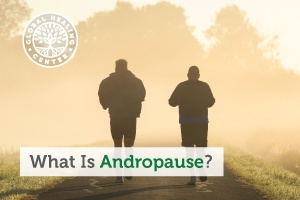
The phenomenon of the biological clock isn’t exclusive to women, it seems men also are prone to age-related changes in hormone levels, sexual function, physical features, and quality of life. These changes, dubbed "andropause" (and sometimes "male menopause") are due to a progressive decrease in testosterone production. As men near middle age, the process speeds up and so may the frequency and effect of the symptoms. Common symptoms include fatigue, reduced muscle mass, erectile dysfunction, loss of libido, and even depression.
Occurrence and Background
How common is andropause? Baylor College of Medicine reports that at least 30% of men 60-70 years of age and 70% of men 70-80 years of age have low testosterone levels. [1] Although the root cause of reduced testosterone availability is decreased testicular function, pituitary concerns may also be a factor. [2] While andropause is a fairly new term, the concept is not. In China, observations have been reported for over 50 years. [3]
Symptoms of Andropause
The symptoms of andropause include loss of energy, depression, sluggish libido, sexual dysfunction, decreased muscle mass and strength, increased body fat, and overall weakness. While the symptoms of andropause might sound like another word for "aging," it's important to note that low testosterone can produce effects far more serious than a new set of aches and pains. According to Baylor College of Medicine and the University of Texas, the likelihood of heart disease, osteoporosis, and bone fractures all increase as testosterone levels decrease. [4]
Dangers of Testosterone Replacement
One of the most common treatments for andropause is testosterone replacement therapy. There are significant marketing forces at work to promote the use of testosterone therapy and they've made it available as a pill, injection, gel, or patch. Certain symptomatic improvements have been reported from hormone replacement therapy but artificial replacements do not mimic the body's natural rhythms. [5] The long-term safety of hormone replacement therapy has not been established and it is especially not recommended for men with prostate cancer or cardiovascular diseases. [6] Furthermore, questions have been raised regarding a potential correlation between long-term testosterone therapy and breast cancer in men. [7]
Can the Symptoms of Andropause be Reduced?
As men age, experiencing the symptoms of andropause may be unavoidable. However, there are steps you can take to lessen the severity. Most of the unpleasant symptoms of andropause get worse when compounding factors are involved. Smoking, being overweight, or having high blood pressure will all exacerbate the symptoms of andropause. If you smoke, stop. If you don't exercise, start. If you could stand to lose a few pounds, lose them. Andropause is change, and change can be difficult. Men who are at their best, physically and mentally, will be the best prepared to face andropause.

Watch an In-Depth Video on How to Balance Your Hormones Naturally
Length: 86 minutes
References (7)
- Hijazi RA, Cunningham GR. Andropause: is androgen replacement therapy indicated for the aging male? Annu Rev Med. 2005;56:117-37. Review.
- Bain J. Andropause. Testosterone replacement therapy for aging men. Can Fam Physician. 2001 Jan;47:91-7. Review.
- Guo Y, Li H. [Male climacteric syndrome (andropause)]. Zhonghua Nan Ke Xue. 2004 Aug;10(8):563-6. Chinese.
- Tan RS, Salazar JA. Risks of testosterone replacement therapy in ageing men. Expert Opin Drug Saf. 2004 Nov;3(6):599-606. Review.
- Wespes E, Schulman CC. Male andropause: myth, reality, and treatment. Int J Impot Res. 2002 Feb;14 Suppl 1:S93-8. Review.
- Renneboog B. [Andropause and testosterone deficiency: how to treat in 2012?]. Rev Med Brux. 2012 Sep;33(4):443-9. Review. French.
- Medraś M, Szczesny M. [Male breast cancer]. Pol Merkur Lekarski. 2003 Aug;15(86):111-4. Polish.
†Results may vary. Information and statements made are for education purposes and are not intended to replace the advice of your doctor. If you have a severe medical condition or health concern, see your physician.







